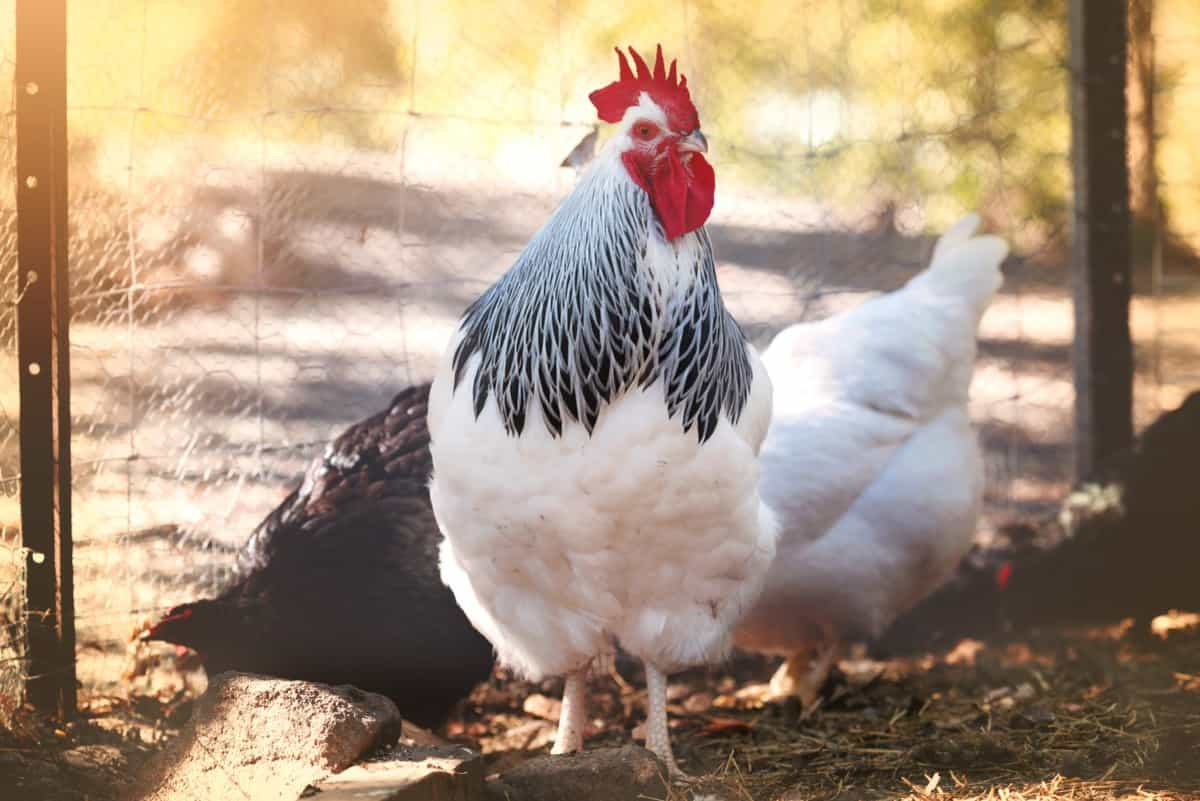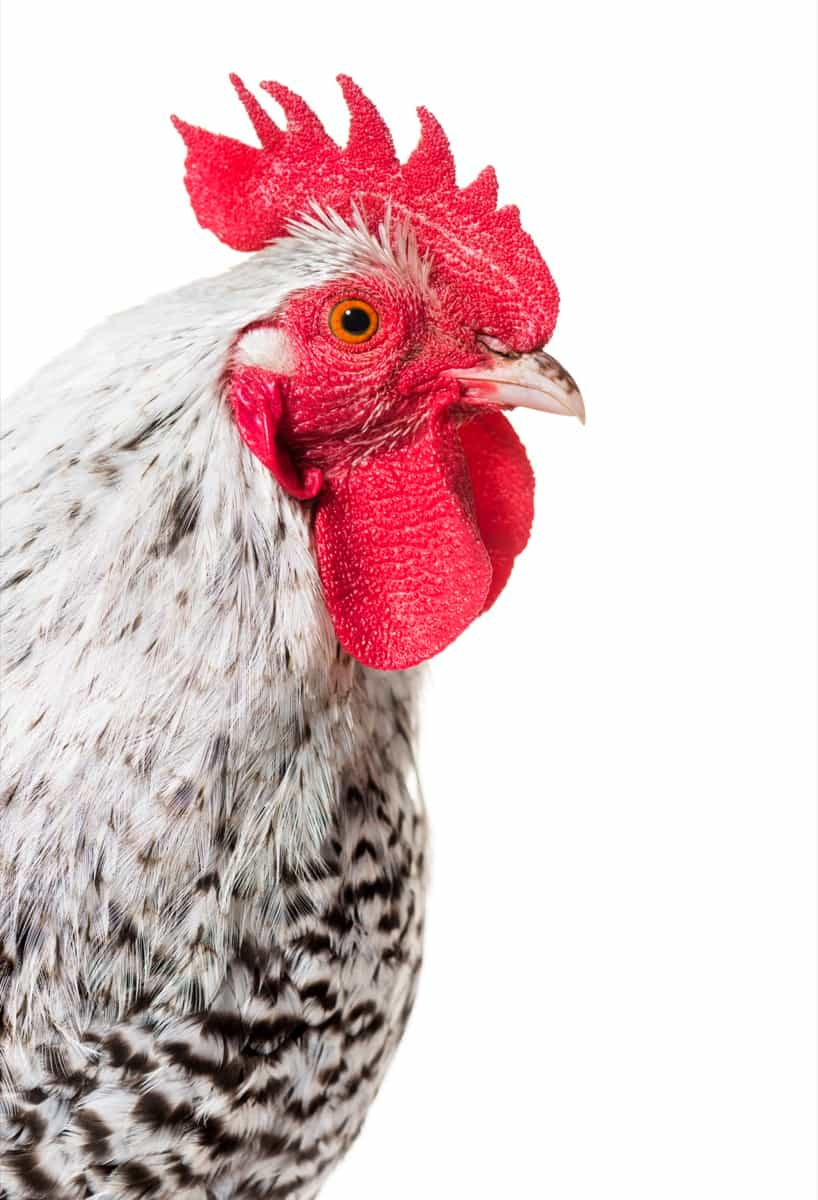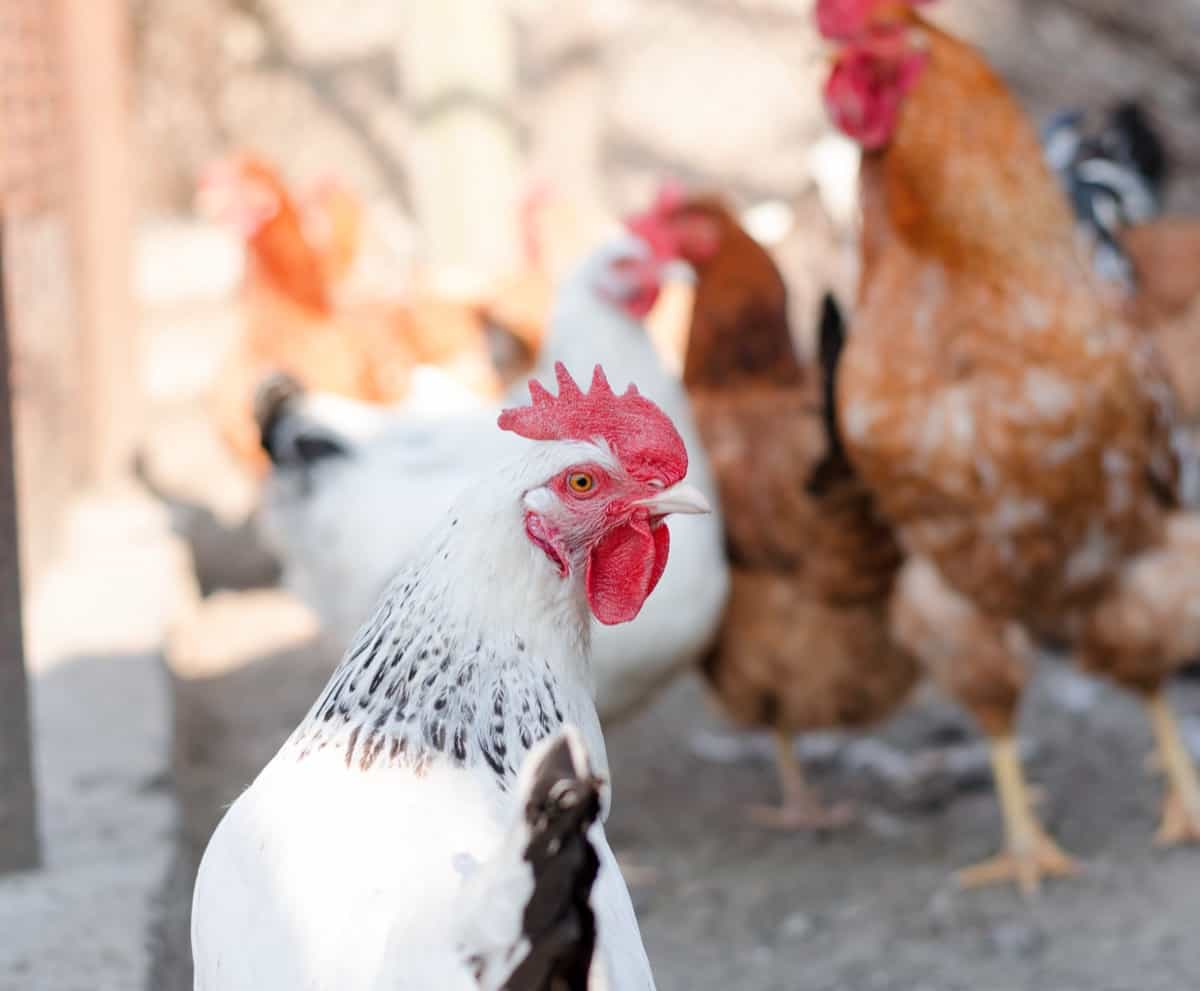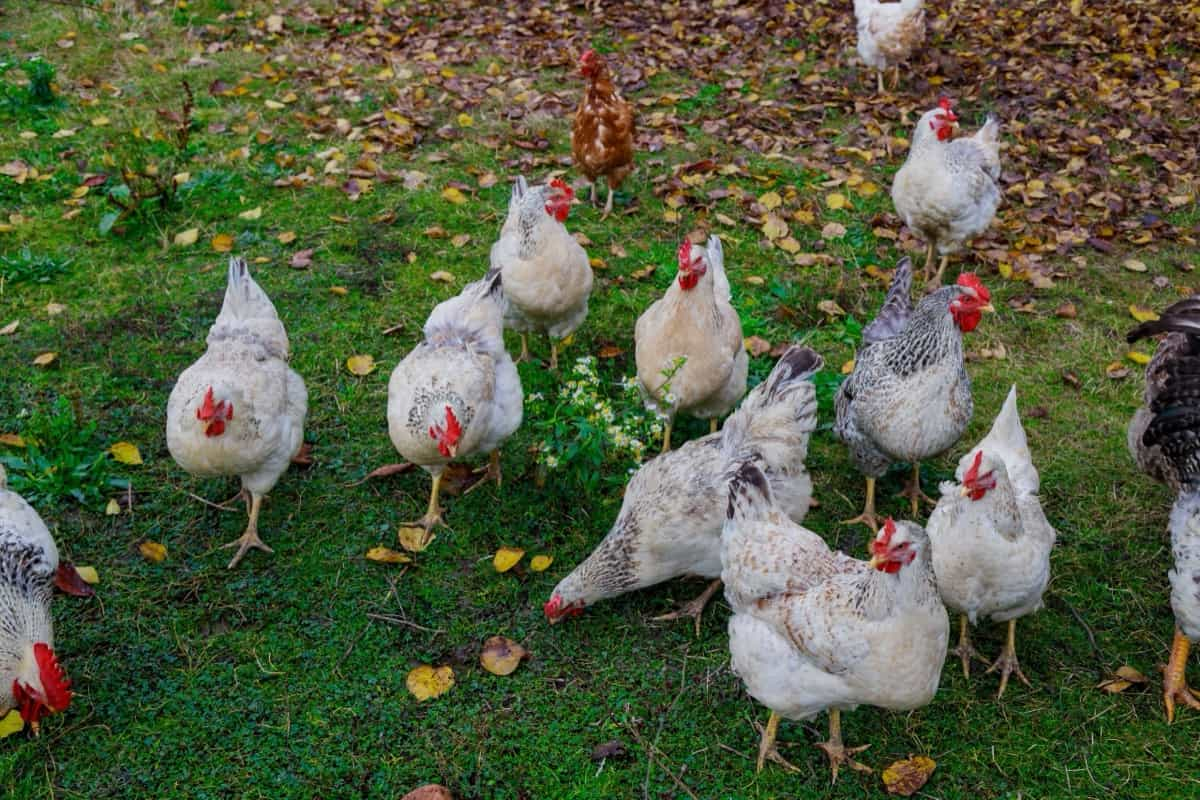Welcome to the Ultimate Guide to Raising Delaware Chickens! Whether you’re a beginner or an experienced farmer, this comprehensive guide covers everything you need to know about breeding, farming practices, diet, egg production, and care for Delaware chickens. Discover the best feed options, coop requirements, and health issues to watch out for.

We’ll also explore winter and summer management, predator protection, and sustainable practices. Uncover the secrets of successful Delaware chicken raising, from hatching and brooding to vaccination schedules and parasite control.
All You Need to Know About Delaware Chicken Farming
Introduction to Delaware Chickens
Delaware chickens, also known as Delaware Blue Hens, are a heritage breed that originated in the United States. They were developed in Delaware in the early 20th century, hence their name. They were bred from crosses between Barred Plymouth Rocks and New Hampshire Reds to create a dual-purpose breed that excelled in both meat production and egg-laying capabilities. The breed gained popularity due to its hardiness, docile temperament, and excellent meat and egg qualities.
Characteristics and Appearance
Delaware chickens are known for their distinct appearance. They have a medium-sized body with a broad and deep breast. Their feathers are predominantly white with black barring on the neck, back, and tail. The barring pattern is a key characteristic that distinguishes Delaware chickens from other breeds. They have yellow legs and beaks, as well as red wattles and comb.
Why Choose Delaware Chickens?
Dual-Purpose Breed: Delaware chickens are excellent for both meat and egg production. Known for flavorful and tender meat, making them a popular choice for backyard farming and small-scale meat production. Additionally, they are good layers of large brown eggs, making them a versatile breed for homesteaders and small farmers.
Docile Temperament: Delaware chickens are known for their calm and friendly disposition. They are generally easy to handle and are suitable for families with children or individuals looking for a peaceful and enjoyable chicken-keeping experience.
Hardiness and Adaptability: Delaware chickens are a hardy breed adapt well to climates and conditions. They are known for their resistance to common poultry diseases and their ability to thrive in both free-range and confined environments.
Heritage Breed Conservation: By choosing Delaware chickens, you are supporting the preservation of a heritage breed. These chickens have historical significance and help maintain genetic diversity within the poultry population.
Preparing for Your Delaware Chickens
- Coop and Run Setup: Delaware chickens require a secure and comfortable coop and run area. We will discuss the ideal size, ventilation, lighting, and predator-proofing measures to consider when setting up your chicken housing.
- Bedding and Nesting Boxes: Providing suitable bedding material and nesting boxes is crucial for your Delaware chickens’ comfort and egg-laying needs. We will explore different bedding options and discuss the ideal nesting box setup.
- Feeder and Waterer Placement: Proper placement of feeders and waterers is essential for easy access and to prevent contamination. We will guide the best placement strategies to ensure your chickens have a convenient and hygienic feeding and watering experience.
- Perimeter Security: Protecting your flock from predators is of utmost importance. We will discuss various predator deterrents and fencing options to safeguard your Delaware chickens from potential threats.
Feeding Delaware Chicken
- Complete and Balanced Feed: Delaware chickens require high-quality, complete poultry feed that is specifically formulated to meet their nutritional requirements. Different types of commercial poultry feeds available and provide recommendations for choosing the best option for your flock.
- Supplemental Feeding: In addition to their primary feed, Delaware chickens can benefit from supplemental treats and kitchen scraps. We will outline safe and nutritious options for treats and discuss the importance of moderation to prevent nutritional imbalances.
- Free-Range Grazing: Delaware chickens enjoy foraging and grazing on fresh greens. We will explore the benefits of free-range grazing and offer tips on how to incorporate it into your flock’s diet while maintaining balance and safety.
In case you missed it: How to Craft a Comprehensive Free-Range Chicken Farming Business Plan

Watering Your Flock
Watering Systems: There are various watering systems available, including traditional waterers, automatic waterers, and nipple drinkers.Advantages and disadvantages of each system and guide you in choosing the most suitable option for your setup.
Water Quality and Hygiene: Clean and uncontaminated water prevent the spread of diseases and ensure optimal health. Discuss the importance of water quality and hygiene, as well as provide tips on maintaining clean water sources for your Delaware chickens.
Watering Frequency: Understanding your flock’s water consumption patterns is vital for providing adequate hydration. We will provide general guidelines on watering frequency based on age, weather conditions, and other factors that can influence water requirements.
Health Management
Regular Health Checks: Conducting routine health check and identify any potential issues early on. We will discuss what to look for during health checks and provide guidance on monitoring your Delaware chickens’ overall health and behavior.
Vaccinations: Vaccinations in preventing and controlling common poultry diseases. We will outline the recommended vaccination schedule for Delaware chickens and discuss the importance of consulting with a veterinarian for guidance on specific vaccines.
Disease Prevention: Implementing proper biosecurity measures is key to preventing the introduction and spread of diseases within your flock. We will guide biosecurity practices, including quarantine protocols, sanitation, and pest control.
Dealing with Common Health Issues: Despite our best efforts, chickens may still experience health issues. We will cover common health issues that Delaware chickens may face, including respiratory infections, parasites, and nutritional deficiencies. We will discuss prevention, identification, and treatment options for these issues.
Parasite Control
External Parasites: External parasites, mites, and lice can cause discomfort and health issues in chickens. Discuss the signs of infestation, prevention strategies, and treatment options for controlling external parasites.
Internal Parasites: Internal parasites, worms, can negatively impact your Delaware chickens’ health and productivity. We will explore the signs of internal parasite infestation, effective deworming methods, and strategies for preventing re-infestation.
Natural and Chemical Control Methods: Various natural and chemical control methods are available for parasite management. We will discuss both approaches, including herbal remedies, diatomaceous earth, and commercial deworming products, to help you make informed decisions for your flock.
Breeding Delaware Chickens
Selecting Breeding Stock: Choosing healthy and genetically sound breeding stock is crucial for successful breeding. We will discuss the characteristics to look for when selecting breeding birds and the importance of maintaining breed standards.
Mating and Fertilization: Understanding the mating behaviors and fertilization process of Delaware chickens is essential for successful breeding. We will explore the natural mating process and artificial insemination techniques, if applicable.
Incubation and Hatching: Once Eggs are fertilized, proper incubation and hatching techniques are necessary to ensure a successful hatch. We will guide temperature, humidity, turning, and other factors that influence the incubation process.
Caring for Chicks: Raising and caring for the newly hatched chicks requires special attention and care. We will discuss brooding essentials, including temperature control, proper nutrition, and socialization, to ensure the healthy development of your Delaware chicks.
In case you missed it: Ultimate Guide to Raising Dominique Chickens: Breeding, Feeding, Egg-Production, and Care

Raising Chicks
Brooder Setup: Creating a suitable brooder environment is crucial for the well-being of your Delaware chicks. We will discuss the ideal brooder setup, including temperature control, bedding options, and space requirements.
Feeding and Nutrition: Providing proper nutrition is essential for the healthy growth and development of your Delaware chicks. We will discuss the nutritional requirements of chicks at different stages and offer guidance on choosing the right starter feed and supplements.
Heat and Temperature Management: Maintaining the appropriate temperature is crucial for the survival and comfort of your Delaware chicks. We will provide temperature guidelines for different age groups and discuss methods for maintaining proper heat levels in the brooder.
Socialization and Handling: Socializing and handling your Delaware chicks from a young age is important for their future behavior and ease of handling. We will provide tips on gentle handling techniques and socialization practices to ensure friendly and well-adjusted adult chickens.
Managing Your Flock
Coop Maintenance: Regular coop maintenance is necessary to ensure a clean, safe environment for your Delaware chickens. We will discuss cleaning routines, ventilation, and other maintenance tasks to keep your coop in optimal condition.
Flock Dynamics: Understanding the social behavior and hierarchy within your flock is important for maintaining harmony and minimizing aggression. We will discuss flock dynamics, pecking order, and strategies for managing any conflicts that may arise.
Egg Collection and Handling: Proper egg collection and handling practices are crucial for maintaining egg quality and reducing the risk of contamination. In this section, we will discuss the best practices for collecting, cleaning, storing, and using eggs laid by your Delaware chickens.
Egg Candling and Quality Assessment: Egg candling is a technique used to assess the quality and development of eggs. We will explain the process and provide guidance on how to identify fertile eggs, detect abnormalities, and determine egg freshness.
Egg Production
Egg-Laying Cycle: Understanding Delaware chickens’ natural egg-laying cycle is important for managing their productivity. We will explain the different stages of the egg-laying cycle, including the onset of lay, peak production, and decline.
Factors Affecting Egg Production: Several factors can influence the egg-laying performance of Delaware chickens. We will discuss key factors such as nutrition, lighting, temperature, stress, and age and provide strategies for optimizing egg production.
Egg Size and Quality: Delaware chickens are known for laying large brown eggs. We will discuss the factors that affect egg size, shell quality, and yolk color and guide how to maintain consistent egg quality through proper nutrition and management practices.
Seasonal Care
Winter Care: Winter brings its own set of challenges for chicken owners. We will discuss strategies for providing warmth, ventilation, and protection against cold weather. Additionally, we will address common winter health concerns and offer tips for maintaining egg production during the colder months.
Summer Management: Managing Delaware chickens in hot and humid conditions is essential to prevent heat stress and maintain their overall health. We will guide providing shade, ensuring proper hydration, and managing ventilation to keep your flock comfortable during the summer months.
Delaware Chickens for Meat
- Growth and Development: Understanding the growth and development patterns of Delaware chickens is important for optimizing meat production. We will discuss growth rates, feed requirements, and strategies for achieving optimal meat quality.
- Processing and Butchering: Proper techniques are essential for ensuring food safety and quality when processing and butchering Delaware chickens. We will guide humane processing methods, dressing, and storing the meat.
In case you missed it: Ultimate Guide to Raising Legbar Chickens: Breeding, Farming Practices, Diet, Egg-Production

Delaware chicken lifespan and longevity
Delaware chickens Originated in the United States in the 1940s. They were developed from crosses between Barred Plymouth Rocks and New Hampshires. One of the most notable characteristics of Delaware chickens is their striking appearance, with predominantly white feathers accented by black barring on the neck, tail, and occasionally the wings.
Delaware chickens have a decent life expectancy for a domesticated breed when it comes to lifespan and longevity. On average, they live between 6 and 8 years, but with proper care and management, some individuals can reach up to 10 years or more. Their robust nature contributes to their longevity, but like all breeds, they require a balanced diet, clean water, regular health check-ups, and protection from predators to thrive.
Backyard Delaware chickens
Delaware chickens are well-suited for backyard farming due to their docile temperament and hardiness. They adapt well to confinement or free-range conditions and are known for being good foragers if given the opportunity. This breed is also tolerant of cold climates thanks to its heavy feathering, which provides ample insulation during colder months. For families or small-scale farmers looking to raise chickens that can provide meat and eggs while also serving as friendly farmyard companions, Delawares makes an excellent choice.
Conclusion
The endeavor of rearing Delaware poultry is gratifying, as they produce an abundance of high-quality flesh and eggs while maintaining a pleasant and docile temperament. A comprehensive comprehension of their historical background, distinctive attributes, and particular care needs is imperative for ensuring success in reproduction, agricultural methodologies, egg production, dietary practices, and overall care.
Note: The images presented in this post are intended solely for representation purposes. The images are meant to serve as visual aids and should not be relied upon as accurate representations of their real-life counterparts.
- Types of Pesticides Used in Agriculture: A Beginner’s Guide
- Economical Aquaculture: A Guide to Low-Budget Fish Farming
- 15 Common Planting Errors That Can Doom Your Fruit Trees
- How to Make Houseplants Bushy: Effective Tips and Ideas
- Innovative Strategies for Boosting Coconut Pollination and Yield
- Pollination Strategies for Maximum Pumpkin Yield
- The Complete Guide to Chicken Fattening: Strategies for Maximum Growth
- Natural Solutions for Tulip Problems: 100% Effective Remedies for Leaf and Bulb-Related Issues
- Revolutionizing Citrus Preservation: Towards a Healthier, Greener Future
- Natural Solutions for Peony Leaf and Flower Problems: 100% Effective Remedies
- Maximizing Profits with Avocado Contract Farming in India: A Comprehensive Guide
- Natural Solutions for Hydrangea Problems: 100% Effective Remedies for Leaf and Flowers
- The Ultimate Guide to Choosing the Perfect Foliage Friend: Bringing Life Indoors
- From Sunlight to Sustainability: 15 Ways to Use Solar Technology in Agriculture
- The Ultimate Guide to Dong Tao Chicken: Exploring from History to Raising
- The Eco-Friendly Makeover: How to Convert Your Unused Swimming Pool into a Fish Pond
- Mastering the Art of Delaware Chicken Farming: Essentials for Healthy Backyard Flocks
- 20 Best Homemade Fertilizers for Money Plant: DIY Recipes and Application Methods
- How to Craft a Comprehensive Free-Range Chicken Farming Business Plan
- Brighten Your Flock: Raising Easter Egger Chickens for Beauty and Bounty
- How to Optimize Your Poultry Egg Farm Business Plan with These Strategies
- Subsidy for Spirulina Cultivation: How Indian Government Schemes Encouraging Spirulina Farmers
- Ultimate Guide to Raising Dominique Chickens: Breeding, Feeding, Egg-Production, and Care
- Mastering the Art of Raising Jersey Giant Chickens: Care, Feeding, and More
- Ultimate Guide to Raising Legbar Chickens: Breeding, Farming Practices, Diet, Egg-Production
- How to Raise Welsummer Chickens: A Comprehensive Guide for Beginners
- How to Protect Indoor Plants in Winter: A Comprehensive Guide
- Ultimate Guide to Grow Bag Gardening: Tips, Tricks, and Planting Ideas for Urban Gardeners
- Guide to Lotus Cultivation: How to Propagate, Plant, Grow, Care, Cost, and Profit
- Agriculture Drone Subsidy Scheme: Government Kisan Subsidy, License, and How to Apply Online
- Ultimate Guide to Raising Araucana Chickens: Breed Profile, Farming Economics, Diet, and Care
- Bringing Hydroponics to Classroom: Importance, Benefits of Learning for School Students
- Ultimate Guide to Raising Polish Chickens: Breed Profile, Farming Economics, Diet, and Care
- Ultimate Guide to Raising Australorp Chickens: Profile, Farming Economics, Egg Production, Diet, and Care
- Silkie Chicken Farming: Raising Practices, Varieties, Egg Production, Diet, and Care
- Sussex Chicken Farming: Raising Practices, Varieties, Egg Production, Diet and Care